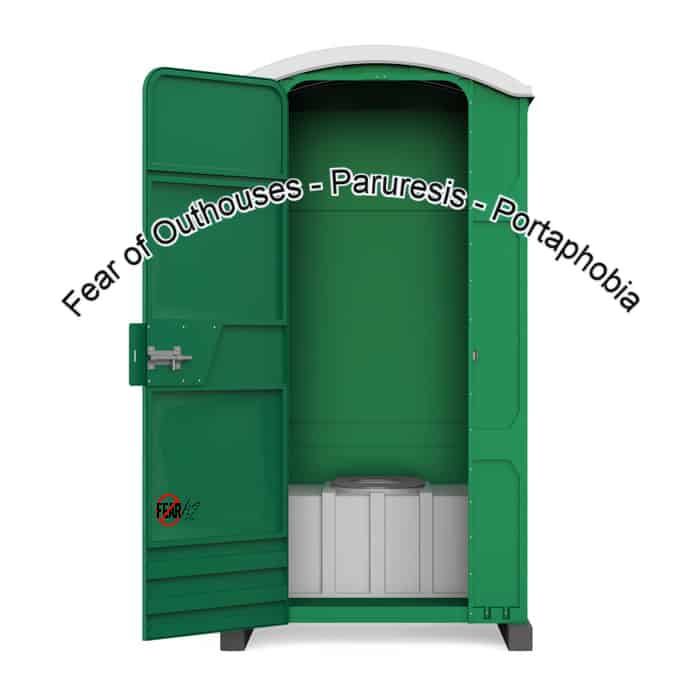Share This Article
Fear of Using an Outhouse: An Inconvenient Fear
Do you find yourself on edge just thinking about making a trip to the outhouse?
Does the idea of using a porta-potty trigger a sense of panic?
Living a life driven by fear can be exhausting, especially if it involves your bladder. And how do you get the help you need if you’re too embarrassed to talk about it?
Fear of outhouses, paruresis, and portaphobia are all terms for the silent fear of outhouses or especially the fear of outhouses at night. Living in fear is never the answer, especially when you have access to resources that can help you combat it. While it may seem like an embarrassing topic to discuss, recognition and acceptance is the first step to finding a solution. Read on for more about combating the fear of outhouses.

Want to know more about the fear of outhouses? You’ve come to the right place!
What Is the Fear of Outhouses?
Paruresis, or portaphobia, is the fear of using public toilets like Porta-Potty, especially in the presence of others. People suffering from paruresis or the fear of outhouses may have a difficult time even stepping into an outhouse much less taking care of business in one. It might be the small space, the smell, or the combination.
Many of us are uncomfortable peeing in the presence of others. As a matter of fact, paruresis—also called shy bladder syndrome—affects an estimated 20 million people in the United States alone. So, you’re not “the socially awkward/weird” person you may think you are. Paruresis is impartial. It affects people of all ages and genders, and it’s believed to be the second most common type of social phobia.
Is Portaphobia a Phobia of Fear or Disgust?
You’d think holding your pee in would offer a temporary solution, right? But it doesn’t. It may actually cause long-lasting medical complications. Paruresis may cause a hindrance in your day-to-day life. It may even lead to social anxiety disorders.
Pair this with hearing stories about people finding snakes in portable toilets and you have an anxiety-filled disaster on your hand. Can snakes get in a Porta-Potty? It’s a question that haunts many who experience the fear of outhouses. Though your fear may be irrational, it is real. Don’t dismiss it.
Paruresis Symptoms
Those with paruresis will resort to everything from holding in their pee/poop to “challenging” themselves to use the public restroom. So it begs the question: Is paruresis a social anxiety? After all, it triggers a feeling of dread and dejectedness at the mere thought of using a public restroom.
So, how do you know that you have a fear of outhouses? How do you know it’s not just a defense mechanism you’ve developed from watching outhouse pranks on the internet?
Paruresis can be diagnosed by keeping an eye out for the known symptoms, including mental, emotional, and physical.
Mental/Emotional Symptoms
Is paruresis a mental disorder? If you’ve wondered that, the answer is no. Paruresis itself is not a mental illness. It does have psychological undertones, which is why it’s difficult to find a distinction between the two.
That said, keep a lookout for these mental/emotional symptoms:
- Avoiding social situations where you might need to visit the public restroom
- Feeling stressed and anxious at the thought of using an outhouse to relieve yourself
- Avoiding traveling or working in a traditional office system, opting for jobs where you work from home instead
- Depression
- Social anxiety disorders
- Needing complete privacy when visiting the restroom for fear that others will hear you pee
Physical Symptoms
- Restricting drinks to reduce the possibility of urination
- Excessive sweating/shaking
- Increased heart rate
If you experience these symptoms and feel they’ve made a drastic impact on your life, consider visiting a doctor before it grows into a more serious health problem.
What Can I Do to Help Myself?
Understandably, people shy away from talking about living with paruresis for fear of critical judgment and embarrassment. So, if you don’t talk about it, how do you overcome paruresis?
The good news is, you can start by helping yourself.
Ask yourself what causes your bathroom anxiety. It could be anything from someone disturbing you while you do your business, past experience or trauma, or family history, among other possible causes. Locating the cause can help you form a plan to tackle the issue.
Here are some ways you can help yourself overcome the fear of outhouses:
- Try relaxation techniques. As this is mostly a psychological problem, tackling anxiety may help you overcome the fear altogether.
- Change the way you think and behave about your phobia. Don’t talk down to yourself when you can’t use a public restroom. Learn what triggers your phobia and actively work towards treating it.
- Start small. If you fear others can hear your pee hit the toilet, go to a quiet, secluded restroom and make as much noise as possible while urinating. Slowly progress to more crowded restrooms.
- Open a conversation. Talk to a friend or a family member and include them in your treatment process.
In some instances, paruresis is linked to a medical condition. If you suspect a health issue, it would be better to visit a healthcare professional who can locate the root cause and prescribe treatments accordingly.
Seeking Professional Help
If you find yourself unable to tackle your fear of outhouses, it doesn’t mean you have to live with it forever. Seeking professional help is your next step.
The most common form of treatment for tackling issues surrounding public toilets is gradual exposure therapy. As the name goes, you’ll be slowly and gradually introduced to a fearful scenario. Having a pee-partner to look out for you can speed up your treatment process.
Because your brain already sees it coming, you’ll experience a lower anxiety response. The treatment may take some time to take effect, as you’re not only dealing with a physical problem here but a mental and emotional one.
You can also talk to your health professional about alternative forms of treatment, such as hypnotherapy and talk therapy.
Tips to Avoid the Issue
What if we tell you you can avoid this phobia altogether? Self-help and professional help go a long way, but you know what else does? Meditation.
With mindfulness and meditation, you can train your brain to create more positive emotions, energy, and focus with less distraction and anxiety. And when your anxiety is significantly reduced, there’s nothing stopping you from using a public restroom.
Another technique is to practice breathing. Do a body scan to reground yourself, and most importantly, cultivate compassion for both yourself and the fear you live with. Once you locate the cause and target it, you won’t be limited by your fear of outhouses.
Wrapping Up
Fear of outhouses is not an uncommon phobia. Chances are, you may already know someone who’s living with this fear but doesn’t know it.
The good news is, it may be possible to manage this fear all on your own. Or if the symptoms are severe, a therapist can help you identify the causes and prescribe a treatment.
Take this time to open a conversation with your loved ones. You don’t have to live a life full of fear. Not alone anyway.



